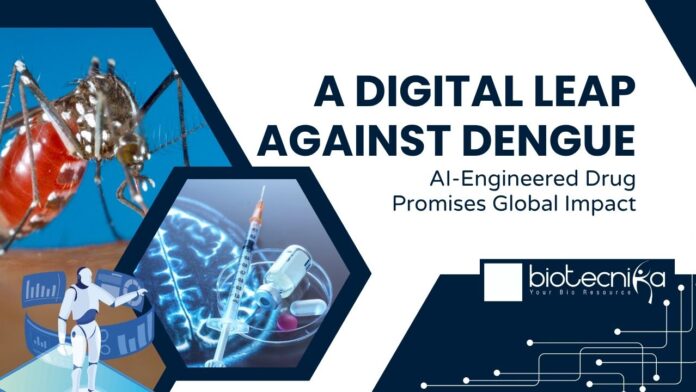AI-Designed Dengue Drug Promises Global Impact
In communities across the world, the arrival of mosquito season often brings more than just itchy bites; it brings fear. Diseases like dengue, Zika, and West Nile have long haunted families, especially in warmer regions, striking year after year without an actual cure in sight. However, the landscape is now shifting. With the power of artificial intelligence, science is beginning to outpace these viruses, offering new hope for faster, targeted treatments.
AI-Designed Dengue Drug: DevsHealth is a European company known for AI-driven drug discovery. Together with the FNDR Foundation for Neglected Diseases Research, located in Bangalore, they have discovered the very first antiviral drug candidate, DHFLV_003B. This is the most important achievement so far since it is the first dengue antiviral compound entirely designed through AI.
It comes at an exciting time, for dengue remains a worldwide health threat, making its presence felt not only in tropical and subtropical regions but also in European countries in an increasing manner. Novel treatments could never have been more urgent.
A First-of-Its-Kind AI-Designed Molecule
The DevsHealth OS platform was designed for DHFLV_003B, which is the lead compound in silico. This development is considered one of the most significant advancements in drug development, as the entire procedure was AI-dependent. Researchers utilized an AI-driven system to generate, simulate, and select potential therapeutic molecules. And the whole process took just a few months, contrary to the traditional methods of drug development. This approach is highly precise and also has significant cost efficiency.
Early Success with High Hit Rate
Nine AI-predicted molecules were produced in the first synthesis phase. Out of which, three of the molecules showed promising results, specifically in terms of antiviral activity. This was tested in cell-based models, and DHFLV_003B proved to be the most promising candidate. It showed a hit rate of about 33%, which is significantly higher than the traditional early-stage drug discovery yields, which used to be just 10% or even lower.
Confirmed Dengue Inhibition
Testing at FNDR’s advanced biosafety labs in Bengaluru confirmed that DHFLV_003B effectively inhibits dengue virus replication in vitro. Researchers have also found that the lead compound can potentially decrease the viral load and severity of the disease. This becomes a promising area of treatment for millions of people who are affected by dengue each year.
Toward Broader Impact: Zika and West Nile in Sight
Building on this success, DevsHealth and FNDR have launched an optimization program to enhance the compound’s potency further. The goal is not only to refine DHFLV_003B for dengue but also to expand its activity against related flaviviruses, including Zika and West Nile viruses. The iterative, AI-assisted approach is expected to accelerate the refinement process while ensuring both accuracy as well as safety.
Commitment to Global Health Equity
Both organizations emphasize equitable access as a central part of their mission. Their shared commitment is to ensure that any future therapy remains affordable and accessible to the general public. Primarily focuses on developing improved treatment procedures for low- and middle-income countries where dengue poses a significant health threat.
Dr. Alfons Nonell-Canals, CEO of DevsHealth, said, “This breakthrough illustrates how AI can radically speed up drug development and help us deliver effective treatments where they are needed most.”
Dr. Shridhar Narayanan, Director of FNDR, mentioned that, “Combining international collaboration with technological innovation is the way forward in addressing neglected diseases.”
Next Steps: Preclinical Validation Underway
The AI-designed dengue drug, DHFLV_003B, is currently undergoing preclinical optimization and validation, with upcoming stages including animal efficacy studies and preparations for human clinical trials. DevsHealth and FNDR hope this innovation will soon translate into real-world impact, setting a new benchmark for AI-led antiviral research.























